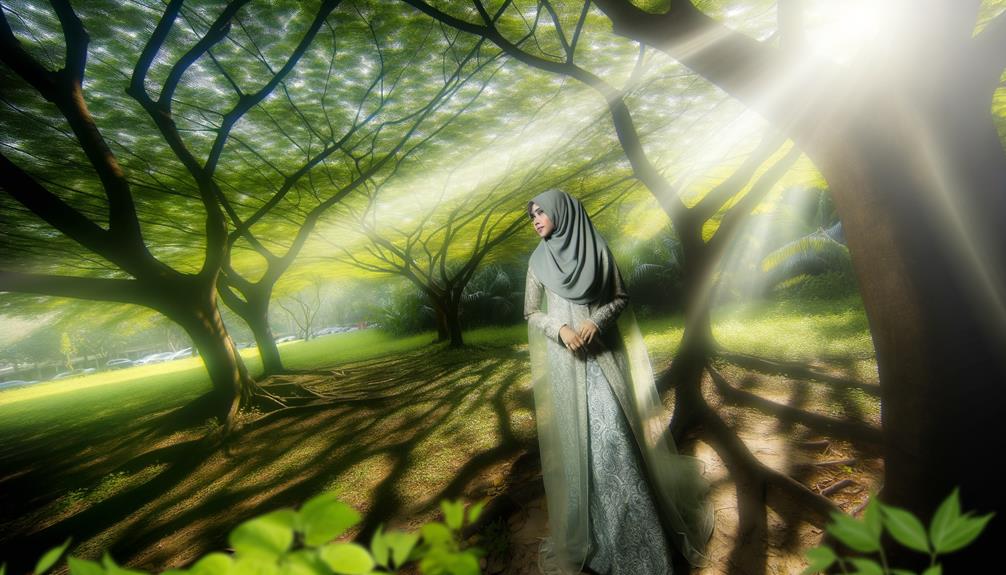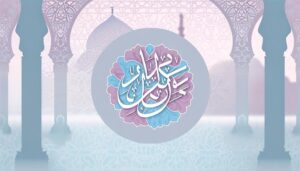Hawa Name Meaning in Islam
In Islamic tradition, the name Hawa is extremely significant, denoting the first woman created by Allah. Rooted in the Quranic narrative (4:1), Hawa, created from Adam's rib, symbolizes life and nurturing.
In Arabic, 'Hawa' translates to 'living' or 'life-giving,' derived from 'hayy' meaning alive. She embodies essential human traits such as partnership, repentance, and divine mercy.
References in Surah Al-Baqarah (2:35) underscore her role alongside Adam. Hawa remains a revered figure in Muslim cultures, reflecting maternal virtues and wisdom.
Exploring further would illuminate her deep cultural and theological significance across Islamic tradition.

Key Takeaways
- Hawa means 'living' or 'life-giving' in Arabic, linked to the word 'hayy.'
- Hawa symbolizes vitality, nurturing, and the essence of life in Islamic tradition.
- Hawa was created from Adam's rib and is the first woman in Islamic anthropology.
- Represents human nature, relationships, frailty, and divine mercy in the Quran.
- Hawa is revered as the mother of humankind, emphasizing equal partnership and faith.
Historical Origins
The name 'Hawa,' often rendered as 'Eve' in English, finds its roots in Islamic tradition and is deeply embedded in the narrative of creation as outlined in the Quran. According to Islamic scriptures, Hawa is the first woman created by Allah, fashioned from the rib of Adam (Quran 4:1).
This creation story underscores the inherent connection and equality between man and woman. Scholars often reference Hadith literature to supplement Quranic verses, providing additional context on Hawa's role and significance. Her creation marks the inception of human companionship and societal structure, forming a fundamental cornerstone in Islamic anthropology.
Therefore, Hawa's historical origins are not merely about identity but also about the divine paradigm of human relationships and social order.
Meaning in Arabic
In Arabic, the name 'Hawa' (حواء) carries the meaning of 'living' or 'life-giving,' reflecting her crucial role in the Quranic creation narrative. This profound attribution underscores Hawa's significance as the first woman and mother of humanity. The term resonates deeply in Islamic theology and scriptural traditions.
- Etymology: Rooted in the Arabic word 'hayy' (حي), meaning 'alive.'
- Symbolism: Represents vitality, nurturing, and the essence of life.
- Cultural Impact: Commonly used in Islamic societies, echoing spiritual heritage.
- Linguistic Variations: Variants of the name appear in multiple languages and regions.
- Historical Relevance: Integral to understanding gender roles and familial structures in Islamic teachings.
This etymological richness encapsulates the spiritual and cultural dimensions of the name Hawa.
Hawa in the Quran
The Quranic depiction of Hawa, known in the Biblical tradition as Eve, underscores her integral role in the narrative of human creation, as referenced in Surah Al-Baqarah (2:35-37).
Hawa's involvement in the events within the Garden of Eden is not merely historical but imbued with profound symbolism and instructive lessons for humankind.
Through examining these scriptural accounts, scholars gain insights into themes of temptation, repentance, and the human condition.
Hawa's Biblical Counterpart
Although Hawa is not explicitly named in the Quran, she is universally understood to be the counterpart of Eve in the Biblical narrative, both representing the first woman and the mother of humankind. The Quran references her indirectly, emphasizing her role in the creation narrative alongside Adam.
Islamic scholars, drawing upon Hadith and Tafsir, elucidate her significance in various dimensions:
- Creation: Hawa was created from Adam's rib, symbolizing intrinsic partnership and equality.
- Temptation: Both Adam and Hawa are depicted as jointly succumbing to Satan's temptation.
- Repentance: Their repentance is accepted by Allah, highlighting divine mercy.
- Human Lineage: Hawa is the progenitor of all humanity.
- Moral Lessons: Their story offers profound ethical and spiritual lessons.
These elements underscore her crucial role in Islamic tradition.
Eve's Role in Creation
Islamic tradition holds that Hawa plays a foundational role in the creation narrative as Adam's partner and the mother of all humanity, even though she is not explicitly named in the Quran. The Quran references the creation of a 'mate' for Adam in Surah An-Nisa (4:1), emphasizing the unity and origin of humankind from a single soul. Surah Al-A'raf (7:189) further elaborates on the creation of a spouse from Adam to provide tranquility and companionship. Scholarly interpretations, such as those from Ibn Kathir, underscore Hawa's integral role in the divine plan, mirroring the Biblical Eve while elucidating the importance of mutual support and harmony in human relationships.
Therefore, Hawa's role is pivotal in the Islamic understanding of human genesis.
Symbolism and Lessons
Hawa's presence in the Quran, though not explicitly named, carries profound symbolic meaning and offers valuable lessons about human nature, relationships, and the divine purpose. Her narrative, intertwined with Adam's, provides insights into several key aspects:
- Human Frailty: Reflects the susceptibility to temptation and the need for constant vigilance.
- Divine Mercy: Illustrates God's boundless forgiveness, as both Adam and Hawa are forgiven for their transgression.
- Equal Partnership: Emphasizes the importance of mutual support and equality between spouses.
- Test of Faith: Highlights the trials faced by humanity in adhering to divine commandments.
- Repentance and Redemption: Demonstrates the power of sincere repentance in restoring one's standing with God.
These elements collectively underscore the Quranic vision of human life and spiritual resilience.
Symbolism and Themes
The name 'Hawa' carries profound symbolism, representing life, creation, and maternal nurturing within Islamic theology and scripture. Derived from the Arabic root 'HYY,' which signifies 'life,' Hawa embodies the essence of existence and vitality.
In the Qur'an, her role as the first woman and the mother of humanity underscores themes of creation and continuity. Hawa's nurturing aspect is metaphorically linked to her name, emphasizing her role in the sustenance and upbringing of future generations.
Islamic scholars often highlight these themes to illustrate divine wisdom in human creation, underscoring Hawa's pivotal role in the divine plan. Her name, hence, is not merely a designation but a profound symbol of life's sanctity and the nurturing spirit inherent in maternal figures.
Hawa and Eve
The name Hawa, recognized in Islamic tradition as the first woman and wife of Adam, parallels the biblical Eve and holds substantial theological and cultural significance.
The Qur'an, while not explicitly naming her, provides context to her role and the symbolic narratives associated with her existence (Surah Al-Baqarah, 2:30-39).
Scholarly interpretations often explore her depiction in Hadith literature and its cultural variations across different Islamic communities.
Origin and Significance
Tracing the origins of Hawa within Islamic tradition reveals her as the Quranic counterpart to Eve in the Judeo-Christian tradition, encapsulating themes of creation, companionship, and moral testing.
Hawa's creation from Adam's rib signifies the profound connection between man and woman, emphasizing mutual dependence and support. Her role extends beyond mere companionship, serving as a foundational figure in human moral experience and spiritual lessons.
- Creation: Originating from Adam's rib, symbolizing unity.
- Companionship: Represents the essential human need for partnership.
- Moral Testing: Involved in the narrative of the forbidden fruit.
- Human Experience: Embodies the beginning of human life on Earth.
- Spiritual Lessons: Offers insights into obedience and repentance.
This multi-faceted significance continues to shape Islamic teachings and perspectives on gender and morality.
Scriptural References
In Islamic texts, Hawa is referenced primarily in the Quran and Hadith. Her story parallels that of Eve in the Judeo-Christian tradition, offering deep insights into themes of creation, temptation, and redemption.
The Quran mentions Hawa indirectly, referring to Adam's spouse in verses such as Surah Al-Baqarah (2:35) and Surah Al-A'raf (7:19-27), narrating the creation and subsequent temptation by Iblis. Although the name Hawa is not explicitly stated in the Quran, Hadith literature, such as Sahih Bukhari and Sahih Muslim, names her and further elaborates on her role.
These texts collectively underscore Hawa's integral part in the human origin narrative, highlighting lessons of human fallibility and divine mercy.
Cultural Interpretations
Examining the cultural interpretations of Hawa and Eve reveals both commonalities and distinctions that shape the understanding of their roles within Islamic and Judeo-Christian traditions. Both figures are considered the first women in their respective scriptures, yet their narratives and implications differ markedly.
In Islam, Hawa is revered as the mother of humanity, created from Adam and viewed with respect and dignity. Conversely, the Judeo-Christian tradition often emphasizes Eve's role in the original sin, impacting perceptions of women historically.
Key aspects include:
- Creation narratives: Hawa from Adam's rib vs. Eve as a helper.
- Role in the fall: Differing views on responsibility.
- Cultural symbolism: Varied representations in art and literature.
- Theological implications: Different lessons and morals.
- Gender roles: Influences on societal norms and values.
Cultural Significance
The cultural significance of the name Hawa in Islam is deeply rooted in its historical and theological associations, particularly as it relates to its scriptural origins in the Quran and Hadith.
Hawa, known as Eve in the Abrahamic traditions, is revered as the first woman and the mother of humankind. The Quranic narrative, specifically in Surah Al-Baqarah (2:35), acknowledges Hawa alongside Adam in the paradisiacal setting, emphasizing her integral role in the divine creation story.
Scholarly interpretations often highlight Hawa's embodiment of maternal virtues and her pivotal part in humanity's inception. Her name carries profound connotations of life, nurturing, and primordial wisdom, reflecting the deep-seated reverence for her in Islamic cultural and religious contexts.
Modern Usage
Modern usage of the name Hawa in Islamic societies continues to reflect its rich historical and theological heritage, often symbolizing virtues such as nurturing, wisdom, and life-giving essence. Derived from the Arabic root 'ḥayy,' meaning 'to live,' the name Hawa is imbued with profound significance.
Contemporary applications of the name Hawa include:
- Spiritual Symbolism: Reflects the first woman and the mother of humanity as per Islamic tradition.
- Cultural Resonance: Commonly used in various Muslim-majority countries, maintaining its traditional roots.
- Linguistic Adaptation: Adapted into various languages and dialects while preserving its original meaning.
- Educational Influence: Frequently referenced in Islamic educational texts and teachings.
- Community Respect: Namesakes are often revered for embodying the virtues associated with Hawa.
These aspects underscore the enduring relevance of the name Hawa.
Famous Namesakes
Renowned for their contributions across various fields, famous namesakes of Hawa include influential scholars, cultural icons, and leaders who embody the virtues and significance associated with the name in Islamic tradition.
One prominent figure is Hawa Abdi, a Somali human rights activist and physician, whose work exemplifies compassion and resilience, values deeply rooted in Islamic teachings.
Similarly, Hawa Aden Mohamed, another notable Somali humanitarian, has made significant strides in advocating for women's rights, reflecting the dignity and strength associated with the name Hawa.
These individuals not only elevate the name but also resonate with the Qur'anic ethos of altruism and justice, emphasizing the timeless relevance of their contributions within the Islamic moral and social framework.
Conclusion
The name 'Hawa' holds profound significance in Islamic tradition, reflecting historical origins, Arabic meaning, and Quranic mentions.
Symbolically, it intertwines with themes of creation, companionship, and human nature, drawing parallels to the figure of Eve.
Cultural relevance is evident from ancient to modern times, enriched by notable namesakes.
Hawa's enduring presence in Islamic discourse underscores its layered meanings, cultural resonance, and spiritual depth, offering a rich tapestry for scholarly exploration and understanding in various cultural contexts.






